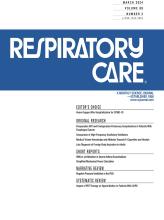This article requires a subscription to view the full text. If you have a subscription you may use the login form below to view the article. Access to this article can also be purchased.
Postoperative pulmonary complications (PPCs) are common after major thoracic and abdominal surgeries.1,2 These complications are associated with diaphragmatic dysfunction, although other factors such as postoperative pain and inflammation likely play a major role in pulmonary dysfunction after thoracic surgery.3 To mitigate the risks of PPCs, inspiratory muscle training (IMT) has been proposed during the prehabilitation period. This proactive approach aims at enhancing the strength of inspiratory muscles through targeted training shown to be effective in preventing PPCs in cardiac surgery.4,5 Esophagectomy, a significant procedure involving both thoracic and abdominal regions, is associated with a notable incidence of PPCs, ranging from 27–51%.6 In theory, esophagectomy offers an excellent opportunity for preventive interventions aimed at reducing PPCs. Yet, the effectiveness of IMT in preventing PPCs after esophagectomy is unclear. Ongoing research is examining the physiological mechanisms underlying IMT’s effects on …
Correspondence: Lorenzo Berra MD. E-mail: lberra{at}mgh.harvard.edu
Pay Per Article - You may access this article (from the computer you are currently using) for 1 day for US$30.00
Regain Access - You can regain access to a recent Pay per Article purchase if your access period has not yet expired.







